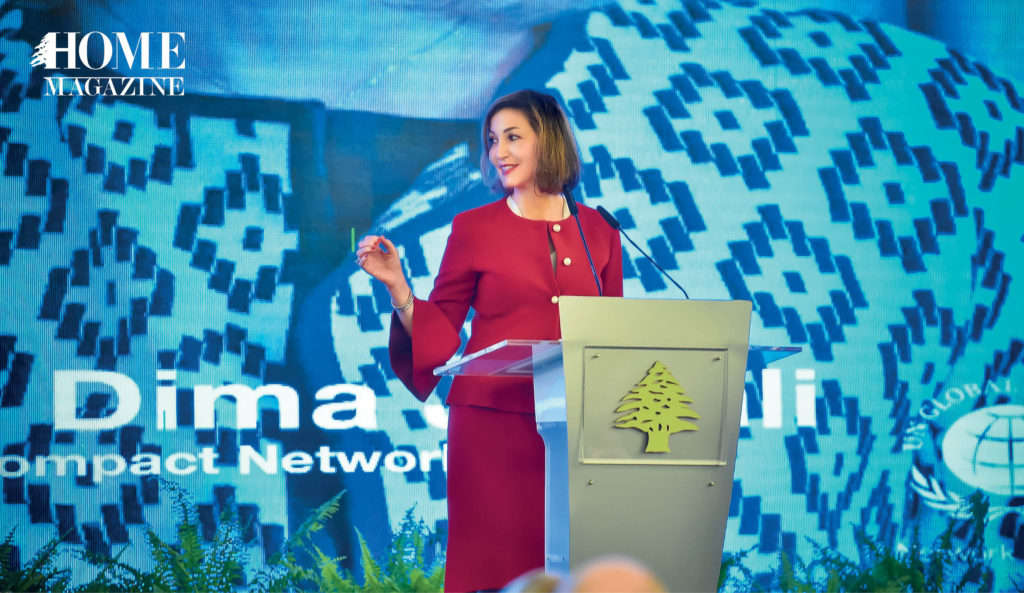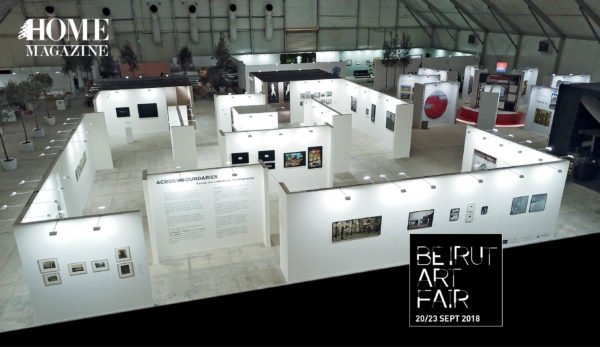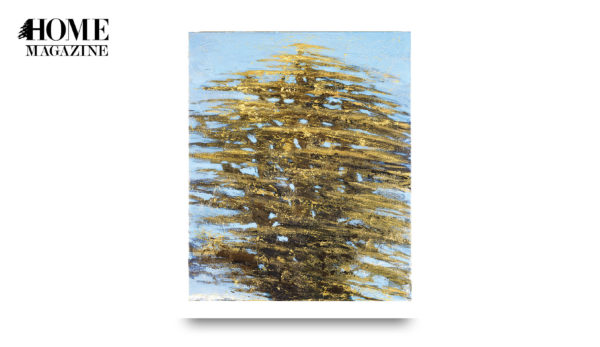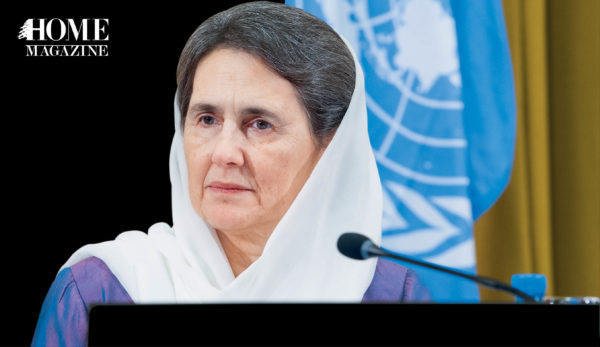Interviewed by: Patricia Bitar Cherfan, Editor-in-Chief
Dr. Dima Jamali is a woman of many hats and her diverse list of accomplishments stands as a testament to her professional versatility. Since victoriously winning a seat in the 2018 parliamentary election, she has been seen as a beacon of hope for Lebanon and its governance. By breaking into the patriarchal fortress, Dr. Jamali has inspired a generation of women to follow in her footsteps, paving a path toward more equal representation in the Lebanese government and beyond.
Dr. Jamali is an accomplished academic who has enjoyed an illustrious career. Among her various roles, Dr. Jamali is the Kamal Shair Endowed Chair in Responsible Leadership and a professor of management at the American University of Beirut’s Olayan School of Business. She holds a Ph.D. in social policy and administration from the University of Kent at Canterbury in the U.K. She serves as a representative of the UN Global Compact Network Lebanon (GCNL), a network of business committed to advancing the Sustainable Development Goals (SDG’s). As an expert consultant she works alongside leading private and public firms to advance sustainability. Having developed an impressive expertise in the field from years of research and teaching, she has written more than 90 international publications and four books: CSR in the Middle East, Social Entrepreneurship in the Middle East, Development Oriented CSR, and Comparative Perspectives on Global Corporate Social Responsibility.
Over the years, her academic work has collect more than 30 awards, most notably the 2010 Shoman Prize for Best Young Arab Researcher and the 2015 Aspen Institute Faculty Pioneer Award, dubbed “the Oscars of the Business School World.” A pacifist and human rights defender, she is an Eisenhower Fellow, part of a global network of leading professionals committed to a more prosperous, just and peaceful world.
Women are no longer with living in the peripheries and have been asserting themselves in the male-dominated realm of politics. Dr. Jamali represents one such example. She is currently an MP for Tripoli, making her one of only six women among 128 members of parliament.
HOME Magazine’s Editor in Chief Patricia Bitar Cherfan met with Dr. Jamali to talk all things academia, politics, women and the next generation.
Business professionals, politicians and academics seem to speak different languages and belong to different worlds. Sadly, knowledge in one sector rarely leaks into another. How have you been able to bridge all three throughout your career?
I have worked closely with industries in the private sector over the years, so I understand how CEOs think and what they’re looking for. It helps me unpack and translate academic language in such a way that is accessible to the private sector. I saw an opportunity to bring all these players together because they share common interests. I was in a position to discover and bring out their commonalities. At the end of the day, there is something in it for everyone: we are all working towards a common objective.

Women’s associations, NGO’s and civil society in general are working on different fronts for women to enter the field of politics. How did you manage to break into the legendary fortress?
The current system does not allow women to break through on their own, especially if they’re running independently. This is true regardless of how accomplished, strong, intelligent or ambitious the candidate is. Personally, there were a number of factors that allowed me to successfully enter the realm of politics. One is my profile which proves that I have the ability and expertise for this position. However, that alone was not enough. Half of my votes reflected the influence of my late father Rachid Jamali, who was the mayor of Tripoli for 20 years. He created a legacy and a path for me to follow. I can see him in the eyes of the people with whom I speak. This makes me feel like I am continuing his unfinished work. The other half of my votes came from the support of the Future Movement and Prime Minister Saad Hariri, who nominated me. During my campaign, I put my life on hold for two months to create rapport with the people. I went on the ground and invested all of my time and effort into it. During this intense period, I met with people of all ages, sectors and backgrounds. I approached them naturally, listening to their stories and concerns and connecting as one of them. I showed them respect and they appreciated that.
My mother was also loved and appreciated in Tripoli. She was a tremendous inspiration for me throughout my life. She was a working mother who served as an anesthesiologist for 15 years.
Although we used to miss having her at HOME, my siblings and I looked up to her and appreciated her drive and determination.
“Women in parliament are working harder than men because we are under the microscope.”
When we bring up the need for more women in politics, government officials, party leaders and members say that this issue is not a priority. What are your thoughts on this objection?
Electing women is a win for politics in general. Women in parliament are working harder than men because we are under the microscope. We have the responsibility to speak for all Lebanese women by showing that we are able to work in full competence. We either need to change the system and set a quota for women to enter government, or we need each political party to set their own quota. A more gender-inclusive government will add value to a party and its constituencies. Some have taken this initiative. What is stopping the others from doing the same?
Many people think of politics as dirty business in Lebanon and refuse to get involved for this reason. How do you reply to those who were against your decision to pursue this path?
I had already made a successful contribution to research and academia, and no longer felt challenged. I had already left my mark there and reached a saturation point; a new door was opening and I needed something new. I realized that by becoming a political actor, I could have an impact on a larger scale. The potential there is huge! This is how I convinced myself to take this step. It was risky, but a risk worth taking. I knew if I hadn’t taken this new path, I would look back 10 years from now and regret it. People were generally hesitant and concerned. My family had their reservations about it and, to be honest, so did I. Once I asserted myself and stood behind my decision, the conversation turned 180 degrees.

You lead a very busy life and the demands on you exceed human capacities. As a scholar, do you feel the fear or pressure of not being able to have the time to read to study issues in depth? Do you feel it is easy to fall into the trap of vain social commitments—a trap many parliamentarians and government officials have fallen into—without a real essence or purpose?
It’s one of the biggest challenges. I deal with media, phone calls, social functions, plus my day-to-day work, meetings in parliament, all while keeping a post in university. I’ve learned from the last few months that I couldn’t continue like this: I had to reset my priorities. I realized that you have to build a solid team. You need to step back and reflect. You need time to refresh and stay sane, to protect some time to study and think. You have to strategize. From there, I started moving very differently.
I sometimes block half a day for that. I say ‘no’ to meetings that are not essential. Otherwise, it is neither healthy nor productive.
As a professor, you deal a lot with the younger generation. What do you think the older generation can learn from the youth, and vice versa?
The youth are more creative and inquisitive. They stand on their feet whatever you throw at them. What we, the older generation, have is that we are more prudent and more strategic. We have gained the experience and insight that come with age but we need the energy and creativity of the youth.
Matching their strengths with ours makes for the best combination.
Speaking with the representative of Tripoli fills one with a sense of pride and reassurance that progress will be made in the political sphere. At the core of her being, her heart speaks of peace.
She states that “peace doesn’t only mean to stop wars, but to stop oppression and injustice.”
The cherry on the top
Dr. Jamali’s looks and glamorous edge are merely the cherry on top. Her grace and presence combined with her razor-sharpness reminds us of Lady Diana who, herself, won the heart of her people. Now Lebanon, too, has its own Lady Di. May Dr. Jamali’s well-deserved position inspire women to follow in her footsteps and men to make room for more outstanding women like her.

































